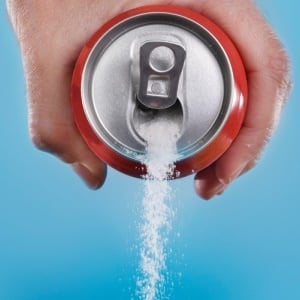
Sugars are a type of carbohydrate found in food and drinks.
They provide your body with glucose, which is the body’s main source of energy and provide 17 kilojoules of energy per gram. Sugars can occur naturally in food or are added to food to make it taste sweeter, change its texture colour and to preserve it.
The differences
Naturally-occurring or intrinsic sugars are found in unprocessed foods such as fruit, some vegetables, milk and unsweetened milk products like yoghurt.
Added sugars are found in most processed foods like sugar-sweetened beverages, sweetened breakfast cereals and fruit drinks; baked goods; confectionery; flavoured yoghurt; condiments and sauces. Sugar can also be added to foods that have naturally-occurring sugars, such dried fruit.
Compared to foods with added sugars, foods with natural sugars, such as fruit and dairy, contain other beneficial nutrients such as fibre, vitamins and minerals. Natural sugars bound in a food matrix that slows down the rate of digestion and absorption. Foods with added sugars are often low in nutrients but high in energy. It is recommended that one should limit foods and drinks that are high in added sugars.
How much added sugar should one have per day?
The World Health Organization recommends adults and children reduce their daily intake of added sugars to less than 10% of their total energy intake.
Choosing foods that are low in added sugars will help in the prevention and management of obesity, diabetes, heart disease, high blood pressure, some cancers, dental cavities, gout and lead to an overall healthier diet.
How can I reduce the amount of added sugar in my diet?
1. Avoid or limit consuming foods and drinks with a high amount of added sugars and avoid or limit adding sugar to your hot beverages.
2. Choose minimally processed foods.
These foods do not contain added sugars:
- Vegetables and fruits
- Unsweetened whole grain products like whole grain, minimally processed bread, pasta and breakfast cereals.
- Unsweetened milk and milk products
- Lean meats, poultry, fish and tofu without pre-made sauce or marinade
- Plain nuts and seeds
- Legumes, like dried beans, peas and lentils
Vegetables, fresh fruits, nuts, seeds and legumes contain fibre, which can help you feel full and make you less likely to overeat.
3. Read food labels to help you choose foods with less added sugars. Check the ingredient list to see if any sugars have been added. If the following sugars are listed as one of the first few ingredients on a food package, the food is likely high in added sugars:
- Agave
- Brown sugar
- Cane juice
- Corn syrup
- Coconut sugar
- Dextrose or dextrin
- Fructose (fruit sugar)
- Fruit juice or concentrate
- Icing sugar
- Invert sugar
- Liquid sugar
- Maltodextrin
- Maltose
- Malt syrup
- Maple syrup
- Molasses
- Nectar
- Galactose
- Glucose
- High fructose corn syrup
- Honey
- Raw sugar
- Sucrose
- Treacle
- Cane sugar
Added sugars like brown sugar, honey, maple syrup, coconut sugar and agave may be considered more "natural", but they are not healthier than other types of added sugars and contain about the same amount of energy
4. Use the nutrient claims on food labels to help you choose foods lower in added sugars with caution.
Manufacturers use nutrient claims to advertise their products. It is however important to look at the product ingredient list and the nutrition information table along with any claim related to sugar, as there are several products on the shelves that carry misleading claims.
A word on non-nutritive sweeteners
These sweeteners can be artificial or natural and are used by some as a way of eating less added sugars. They include substances such as aspartame, sucralose or stevia to name a few. It is important to note that not all foods that are sweetened with sugar substitutes are healthy or low in energy.
Read more:
References
1. http://www.pennutrition.com/viewhandout.aspx?Portal=VLGMKA==&id=J8HrUAI=&PreviewHandout=bA== (Accessed 1 May 2017)
2. Foodstuffs, Cosmetics and Disinfectants Act (Act 54 of 1972), Regulations relating to the labelling and advertising of foodstuffs, R.146. 1st March 2010.
3. World Health Organization Sugars intake for adults and children guideline (2015). http://www.who.int/nutrition/publications/guidelines/sugars_intake/en/ (Accessed 1 May 2017)
4. Foodstuffs, Cosmetics and Disinfectants Act (Act 54 of 1972), Regulations relating to the use of sweeteners in foodstuffs, R.733. 10th September 2012.




 Publications
Publications
 Partners
Partners










